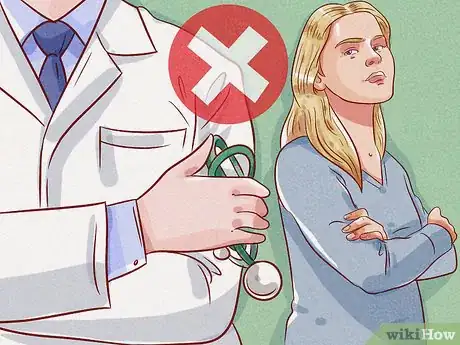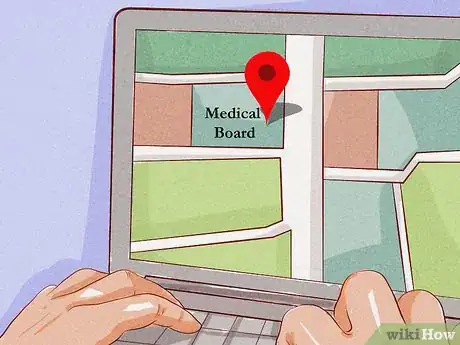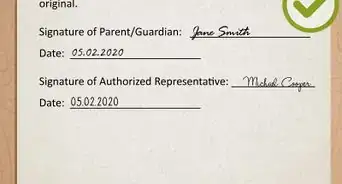This article was co-authored by wikiHow staff writer, Jennifer Mueller, JD. Jennifer Mueller is a wikiHow Content Creator. She specializes in reviewing, fact-checking, and evaluating wikiHow's content to ensure thoroughness and accuracy. Jennifer holds a JD from Indiana University Maurer School of Law in 2006.
This article has been viewed 26,675 times.
Learn more...
If your doctor does something you don't agree with or something you think is unethical, you can typically report them either to their superior or to the Medical Board that regulates doctors where you live. In some situations, however, it may actually be easier to try to talk to your doctor directly first. However, if your doctor’s conduct doesn’t improve or if you’re concerned about malpractice, you can file a complaint directly with the hospital or the Medical Board.
Steps
Talking to Your Doctor
-
1Write down your concerns before bringing the issue up with the doctor. Because doctors can be intimidating, it might help to write down specifically what you want to talk to your doctor about. That way you won't forget anything if you get flustered or agitated. This is especially valuable if you have more than one issue you want to discuss.[1]
- For example, if your doctor never sees you on time, making you wait for hours, and also belittles you, you could write down both of those things.
Tip: Try to give your doctor the benefit of the doubt. Except for the most severe instances, look for patterns of behavior rather than single, isolated incidents.
-
2Schedule an appointment to chat with your doctor. It's typically best to handle the situation as quickly as possible. While you can talk to your doctor at your next appointment, you may want to come in earlier if your next regular appointment isn't scheduled for several months.[2]
- To get this appointment, you might say "I'd like to discuss an issue with you briefly. Can you fit me in some time next week? It should only take 10 to 15 minutes of your time."
Advertisement -
3Ask the doctor about their intent in saying or doing what they did. Doctors often communicate in a direct, fact-based way, and sometimes may not realize that the particular words they used upset you. If your doctor said or did something that offended you, try to understand their intentions first.[3]
- For example, suppose your doctor was discussing your weight with you and said "Do you even exercise?" in a rather short tone. You took this as a sarcastic, condescending remark. However, when you ask your doctor what they meant by that, they might say "I was literally asking if you exercised. If not, I was going to offer you some plans to get you on the right track."
- As another example, suppose your doctor touched you in a way that made you feel uncomfortable and that was not part of any examination. You might ask them why they touched you that way, and what they were thinking when they did it.
-
4Let the doctor know how their words or actions bothered you. Even if their intentions were honorable, it's important for you to let your doctor know that you were hurt, upset, or insulted by what they said or did. Give them an opportunity to apologize for hurting your feelings.[4]
- For example, you might say "When you told me I needed to lose weight, it took me back to those kids who made fun of me in elementary school. I'm trying to lose weight but it's a real struggle, and it hurt me to be told that in such blunt terms."
-
5Explain how you'd like the issue handled in the future. Simply bringing up something that bothers you is a start, but you also need to tell your doctor how you want them to communicate or behave towards you in the future. Let them know what types of things are acceptable to you. It might be appropriate to discuss various hypothetical scenarios with your doctor so they have a better understanding of how to approach you.
- For example, if your doctor offended you when talking about your weight, you might give them words and phrases that are okay to use, and words and phrases that are off-limits or that hurt you.
- Focus on positive illustrations as ways to improve your relationship with your doctor. If you just give them a list of things they shouldn't say to you, they may feel limited or not know how to speak frankly with you.
-
6Wait to see if the situation improves. Once you've had this discussion with your doctor, that should be the end of any problems you have. However, if your doctor continues with the same behavior, even after you've had a conversation with them about it, you may want to report the doctor to someone else, or consider looking for a new doctor.
- You may want to research the rules that govern doctors' behavior to see if your doctor has violated one of those rules. If they have, you may be able to report them to the Medical Board so they will be held accountable for their actions.
- Keep in mind that there aren't really any rules that require your doctor to be kind and polite. If your complaint is that your doctor is rude, you may be better off simply finding a new doctor.
Tip: If your doctor makes you feel uncomfortable or unsafe, don't be afraid to leave. The one thing you can always do is find a new doctor. You can still report the doctor if you wish, even if you are no longer their patient.
Taking Your Complaint to a Superior
-
1Stop seeing the doctor if you no longer feel comfortable with them. Regardless of the outcome of your complaints, if you no longer feel comfortable with your doctor because of what happened, you should find a new one. The doctor will no longer be able to give you the appropriate standard of care if you don't trust them.[5]
- You can still continue to pursue a complaint, even if you are no longer seeing that doctor. In some cases, it may even cause superiors to take your complaint more seriously.
-
2Find out who the doctor reports to. If the doctor works at a hospital or larger private practice, they likely report to a practice manager or owner, or to a department head. Taking your complaint to this person may achieve results you weren't able to achieve on your own.[6]
- If your doctor works at a hospital, call the hospital and ask who's in charge of the department where your doctor works.
Tip: If you're not comfortable asking your doctor specifically, you can ask another doctor or a nurse who works with your doctor who your doctor reports to.
-
3Draft a letter outlining your complaint. Write a formal business letter that briefly explains who you are and describes the incident or the reason you're complaining about the doctor. Include as many specific details as you can, including the date and time the incident (or incidents) occurred. Let the supervisor know what steps, if any, you've taken to resolve the situation before taking it to them.[7]
- You can describe how your doctor's words or behavior affected you or made you feel, but otherwise, try to stick to the facts. Avoid emotional pleas and loaded language. For example, instead of saying that your doctor was rude, provide specific examples of instances in which your doctor was rude.
-
4Submit your letter to the manager or department head. Once you've finished your letter, proofread it carefully for any errors, then print it and sign it. Make a copy of your signed letter for your records, then mail it to the manager or department head you identified as your doctor's superior.[8]
- You may want to mail your letter using certified or registered mail with return receipt requested, so you know when the supervisor received your letter.
-
5Wait to hear from the manager or department head about your complaint. The manager or department head will review your complaint when they receive it. They may also want to talk to you (either on the phone or in person) about the incidents you described in your complaint.[9]
- Typically, the manager or department head will tell you that they will talk to the doctor about your complaint. They also may not get in touch with you until after they've talked to the doctor. In that situation, they may tell you what your doctor said.
-
6Escalate your complaint to the next level if it isn't resolved. If the doctor's direct superior doesn't do anything to address your complaint, or if you're not satisfied with their response, there may be somebody above them who would be able to help you.[10]
- For example, if your doctor works at a hospital, there may be an ethics review board or disciplinary committee that handles grievances for the entire hospital. You can find out by calling the hospital's customer service or patient services number and asking.
Filing a Complaint with the Medical Board
-
1Choose a different doctor if necessary. If your doctor is guilty of serious ethical violations, there is no reason for you to continue seeing them. Your complaint to the Medical Board will be taken no less seriously if you are no longer an active patient of the doctor you complain about.[11]
- It also isn't necessary to confront your doctor at this point. You can simply cancel any appointments and find another doctor. You don't have to communicate with them again at all.
-
2Locate the Board responsible for regulating the doctor. Search online for the name of your city, state, or country and "medical board." This should help you find the correct website. In some places, the Board operates nationwide, while in others, doctors are regulated at the state or local level.[12]
- For example, US doctors are regulated at the state level. So if you wanted to report a doctor practicing in Atlanta, Georgia, you would contact the Georgia Composite Medical Board.
-
3Review the standards of medical practice that the Board regulates. Generally, the Board takes complaints about doctors who have violated laws or regulations that apply to them, engaged in "unprofessional conduct," or provided less than the minimum standard of care. The Board may have examples of these types of situations on its website, as well as information about the laws that apply to doctors in the practice of medicine.[13]
- Keep in mind that if your complaint doesn't discuss conduct that fits into one of the areas the Board regulates, the Board cannot respond to your complaint or do anything to help you.
-
4Complete an official Board complaint form. Each Medical Board typically has its own form that you must fill out to submit a complaint against a doctor. These forms can usually be downloaded from the Board's website, along with instructions on how to complete them.[14]
- The form asks for your name and contact information. Some Boards may not allow anonymous reports at all. However, even if anonymous reports are allowed, you should consider including your name and contact information in case a Board officer wants to contact you to discuss your complaint.
- Be detailed and factual in your description of the incidents that form the basis of your complaint. Include the dates and times, as well as any other significant details.
-
5Submit your complaint to the Board. Once you've finished your complaint, proofread it carefully. When you're satisfied that the complaint is complete and accurate, sign and date it. Make a copy of your signed complaint before you send it to the Board.[15]
- Some Boards may allow you to submit a complaint online. These complaints are "signed" using an electronic signature, in which you simply type your name.
Tip: Although there generally isn't a legal deadline for how long after an incident you have to file a complaint, it's best to file your complaint as soon as possible after the incident takes place, while any evidence is still fresh.
-
6Wait for the Board to contact you. When the Board receives your complaint, it will launch an investigation if your complaint falls within the Board's regulatory authority. An investigator may call you or send you a letter to ask you follow up questions regarding your complaint.[16]
- In the event that the doctor is brought before an administrative law judge for disciplinary proceedings, you may be called upon to testify at the hearing. You don't generally need an attorney for this. Remember – you are not a party to the case and you are not on trial.
References
- ↑ https://www.americannursetoday.com/how-to-handle-disruptive-physician-behaviors/
- ↑ https://www.americannursetoday.com/how-to-handle-disruptive-physician-behaviors/
- ↑ https://www.medicalbag.com/nurse-practitioners/condescending-doctors-and-how-to-deal-with-them/article/472725/
- ↑ https://www.americannursetoday.com/how-to-handle-disruptive-physician-behaviors/
- ↑ https://medicalboard.georgia.gov/my-doctor-was-rude-what-should-i-do
- ↑ https://www.medicalbag.com/nurse-practitioners/condescending-doctors-and-how-to-deal-with-them/article/472725/
- ↑ https://www.americannursetoday.com/how-to-handle-disruptive-physician-behaviors/
- ↑ https://www.americannursetoday.com/how-to-handle-disruptive-physician-behaviors/
- ↑ https://www.americannursetoday.com/how-to-handle-disruptive-physician-behaviors/
- ↑ https://www.ncbi.nlm.nih.gov/pmc/articles/PMC5265230/
- ↑ https://medicalboard.georgia.gov/my-doctor-was-rude-what-should-i-do
- ↑ https://medicalboard.georgia.gov/how-do-i-file-complaint-against-doctor-or-hospital
- ↑ https://medicalboard.georgia.gov/how-do-i-file-complaint-against-doctor-or-hospital
- ↑ https://www.health.ny.gov/forms/doh-3867.pdf
- ↑ https://www.health.ny.gov/forms/doh-3867.pdf
- ↑ https://medicalboard.georgia.gov/how-do-i-file-complaint-against-doctor-or-hospital
- ↑ https://medicalboard.georgia.gov/my-doctor-was-rude-what-should-i-do
- ↑ https://www.ncbi.nlm.nih.gov/pmc/articles/PMC5265230/








































































Medical Disclaimer
The content of this article is not intended to be a substitute for professional medical advice, examination, diagnosis, or treatment. You should always contact your doctor or other qualified healthcare professional before starting, changing, or stopping any kind of health treatment.
Read More...